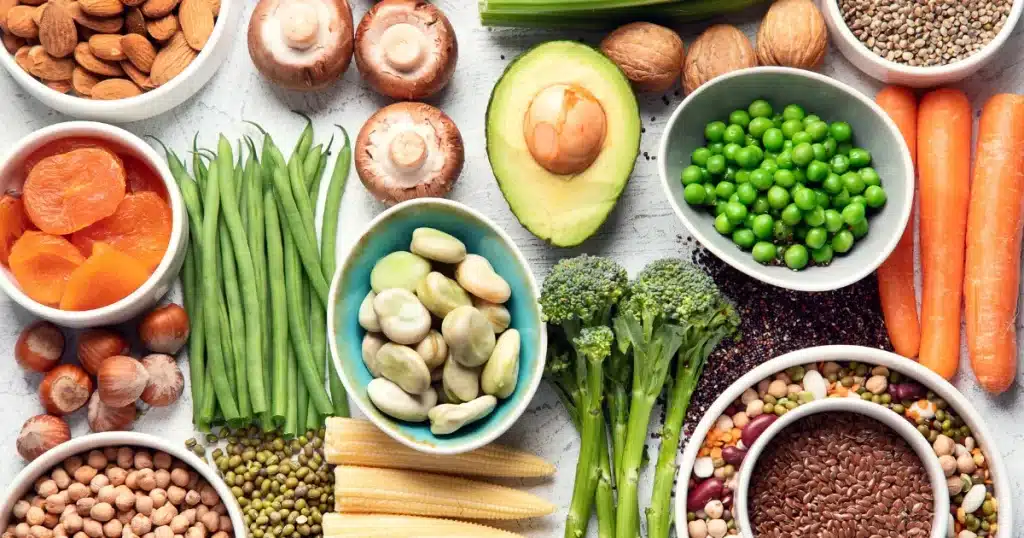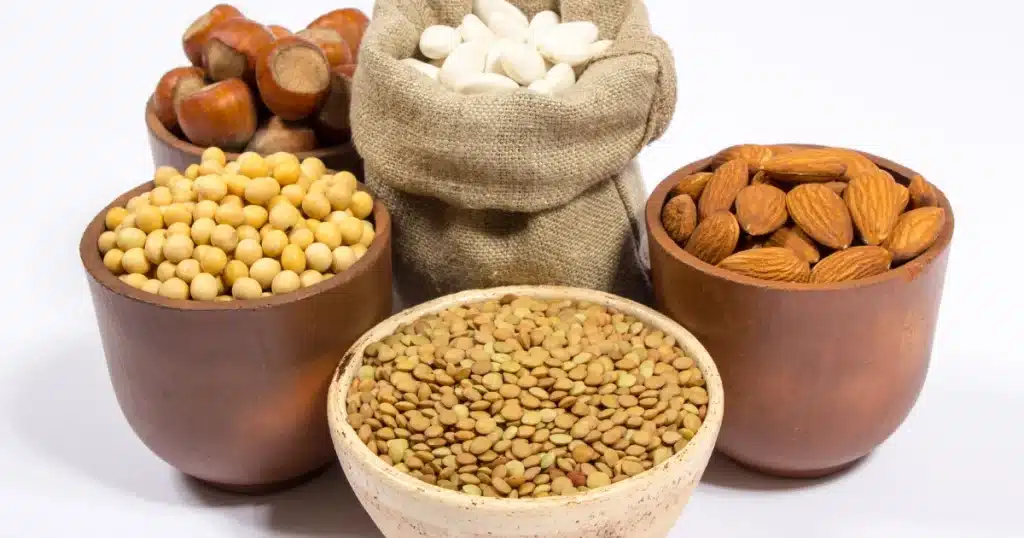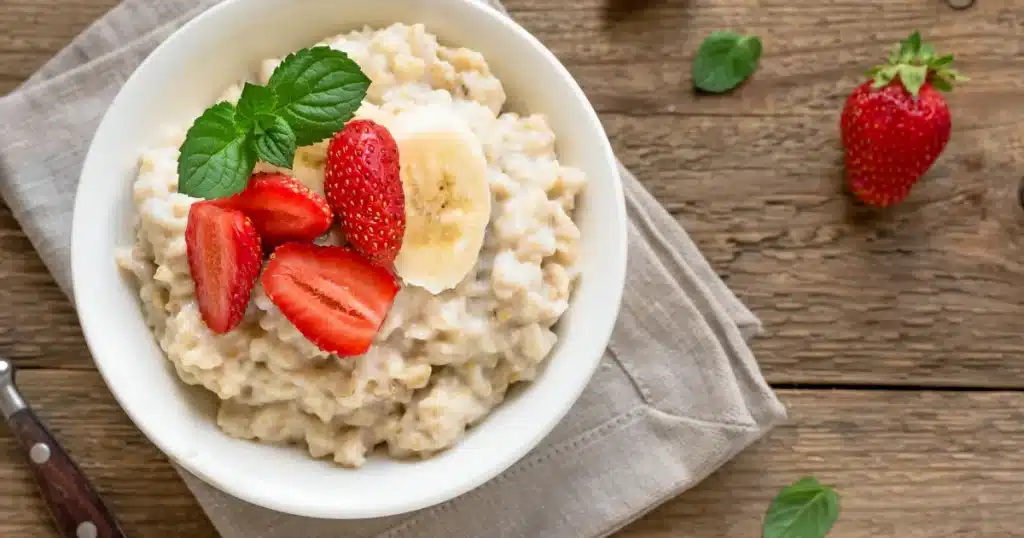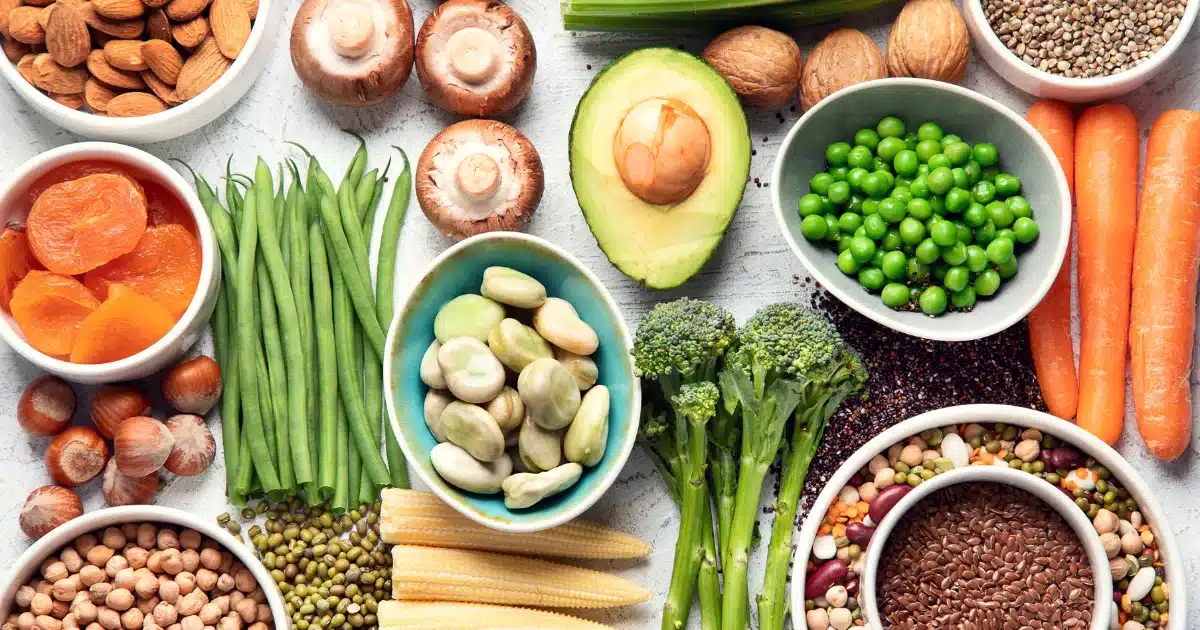RUNNING →
Level Up Your Nutrition Game With Our Freebies
Alex
I provide nutrition coaching for endurance athletes to improve performance and body composition through a simple and flexible eating style.
Hi, I'm
ATHLETE EATING GUIDE →
PROTEIN →
TRIATHLON →
RECIPES →
PERFORMANCE NUTRITION →
SUPPLEMENTS →
HOLIDAY & TRAVEL →
PLANT-BASED →
FEMALE ATHLETE NUTRITION
Explore the Blog
LEARN MORE →
ATHLETE GROCERY SHOPPING GUIDE →
RACE DAY: TRIATHLON NUTRITION PLANNER →
READY TO FUEL?
incredible value!
The fueling guide bundle serves as your one-stop-shop for strategies to fueling before, during and after your workouts.
ENDURANCE EATS
BINGE-WATCH READY!
YOUTUBE SERIES

Considering a plant-based diet as an endurance athlete? During the past few years, we have seen a rise in plant-based athletes. Whether it is for ethical, environmental, or other reasons, many athletes choose to eat a more plant-focused diet.
So in today’s article, we wanted to dive more into how to be a successful plant-based athlete. This includes everything you need to know about the three macronutrients, fiber, and the importance of strategic planning. Keep reading to learn more!
What do plant-based athletes eat?
There are many types of plant-based diets out there. There’s a wide spectrum. A person’s diet of choice will be determined by what foods they choose to eat and omit. I personally like to use the term “plant-based“, referring to any diet that is focused primarily on plants, but doesn’t necessarily mean that it’s void of all animal-based foods.
Here is a breakdown of the different categories of plant-based diets:
- Vegan: a vegan diet excludes all foods that contain animal products or animal byproducts. This includes meat, fish, dairy, and eggs. Vegan diets are the most restrictive and may also include avoiding animal products in other parts of life, such as leather and wool clothing.
- Pescatarian: a pescatarian is someone who does not eat meat or poultry, but still consumes fish, shellfish, and seafood. They may also eat dairy and eggs.
- Vegetarian: vegetarian diets are very popular and tend to be less restrictive than vegan diets. A vegetarian diet does not eat meat or fish but may eat dairy or eggs. Here are the three types of vegetarian diets:
- Lacto-ovo Vegetarian: a vegetarian diet that excludes meat and fish, but does eat cheese.
- Lacto Vegetarian: a vegetarian diet that excludes meat, fish, and eggs, but includes all types of dairy. This may include yogurt, cheese, milk, etc.
- Ovo Vegetarian: a vegetarian diet that excludes meat, fish, and dairy, but still includes eggs.
- Plant-centric/Flexitarian: this is a diet that focuses on eating mostly plant-based foods, but doesn’t exclude animal products such as meat and poultry. A “flexitarian” diet is the most flexible of the plant-based diets. The foundation is built on plants, and then animal products are eaten depending on the person. A flexitarian-style diet is also a great option for anyone looking to transition slowly into a more plant-centric diet.
Is plant-based better for athletes?

This is a question that many athletes ask. Is a plant-based diet better for athletes than an omnivore diet? The answer- there really is no clear answer. It isn’t a matter of which one is better, more up to you to make an informed choice on your own. Then once that choice is made, consider how you can optimize your diet whether plant-based or not.
A plant-based diet isn’t a magic pill. If you are choosing to go plant-based because you think it will help you become a better athlete, that may not be the right reason. However, if you choose to eat plant-based for ethical and/or environmental reasons, you can absolutely still reach your fueling goals.
In general, eating a plant-based diet as an athlete will require more planning and preparation. It takes a bit more thought to make sure you are still getting the nutrients and energy requirements that you need.
Not to say that plants aren’t nutrient-dense, but vegetarian and vegan diets have been shown to be low in important nutrients such as vitamin B12 and iron. Luckily, there are plenty of plant-based supplements on the market to help replenish any nutrients as well. Thorne is one of my fav brands and you can use this link to shop 15% off Thorne supplements!
Plant-Based Carbohydrates
Carbs are essential for endurance athletes to stay well fueled and ready for long training sessions and workouts. Plant-based diets tend to be naturally high in carbs since even plant protein and fat sources have a higher carb count.
Aim to get most of your carbs from nutrient-dense, complex carb sources such as whole grains. Complex carbs are found in whole, unprocessed foods and will have higher amounts of important micronutrients and fiber that your body needs. Simple carbs are more refined and processed, making them devoid of as many nutrients.
Ideas of complex carbs include whole wheat bread, oats, brown rice, bran, buckwheat, chickpeas, lentils, and fruits and vegetables.
Bonus tip: If you are a runner or triathlete and looking to avoid any GI discomfort before a workout, choose a pre-training meal that is higher in simple carbs, rather than complex carbs and lower in fiber. Skip the chia seed pudding and opt for a plain bagel or white rice instead!
Plant-based Athletes: Protein

There are many misconceptions out there about plant-based diets and protein. Especially when talking about athletes because we know that protein is a very important macronutrient for performance and muscle growth. For more information about how much protein athletes need, check out my blog post here.
However, getting enough protein through plant-based sources is very possible. The key is to focus on eating protein from a variety of plant sources instead of just one or two.
This is because proteins are made up of amino acids and while animal protein contains all essential amino acids, plant protein sources may not. If you incorporate multiple plant protein options into your day, you will more than likely get all of your amino acids. Plant protein sources include soy, beans, legumes, nuts, seeds, and some grains.
Plant-based Athletes: Healthy Fats
Last, but certainly not least, is the third macronutrient: fat! As with omnivore athletes, plant-based athletes should get 20-30% of their calories from fat. I know in the past athletes have feared fat, but I am here to let you know that there is nothing to be afraid of. Fats are an important part of an overall healthy and balanced diet for athletes.
However, not all fat is created equal. We use the term “healthy fats” to describe fat sources that are lower in saturated fat and high in unsaturated fats. Unsaturated fats are made up of fats such as omega-3s and have been shown to have positive benefits on your overall health.
There are plenty of plant-based sources of healthy fats you can add to your meals. Choices include avocados, nuts, nut butter, seeds, and olive oil.
Fiber and Micronutrients

Let’s touch on the importance of fiber and other micronutrients.
Fiber is a type of plant-derived carbohydrate that your body is not able to digest. There are both soluble and insoluble forms of fiber. Soluble fiber dissolves in water and helps move along your GI tract, while insoluble does not dissolve in water and adds bulk to stool.
Since fiber is only found in plant sources and not in animal products, most plant-based eaters have no issues getting their daily amount of fiber. High-fiber foods include beans, legumes, fruits, vegetables, and whole grains.
Micronutrients are also vital for athletes looking to perform well and recover efficiently. As I mentioned before, plant-based diets may lack micronutrients that are typically found in only animal products. This can lead to nutrient deficiencies that you do not want! Nutrients to focus on and keep in mind are vitamin B12, vitamin D, omega-3s, calcium, iron, and zinc.
The Takeaway
Whether you are already plant-based or looking to be more plant-centric, I hope this article helped you make a more informed decision. With the right planning, plant-based athletes can be very successful. And regardless of your diet, we know that eating large amounts of fruits and vegetables is beneficial for health and longevity.
If you are a plant-based endurance athlete who is looking for additional guidance and support, our 1:1 nutrition coaching program may be a great fit for you! We are a specialized team of sports dietitians that can help you enhance your performance with a personalized path and accountability. Head over to our services page for more information and to apply today!
Alex
I provide nutrition coaching for endurance athletes to improve performance and body composition through a simple and flexible eating style.
Hi, I'm
LEARN MORE →
take the quiz!
Let's discover your Endurance Nutrition IQ
How well do you know your fueling? Answer these questions and let's see where your endurance nutrition knowledge is at!
Take the quiz
level up your nutrition game with these freebies
free downloadS
Protein-Packed 10-Day Sample Meal Plan
Athlete Eating Guide
Athlete Grocery Shopping Guide
1
2
3
Inspiration to fit 120 grams of protein into your day
Planning what goes on your plate
Putting the right foods in your grocery cart
